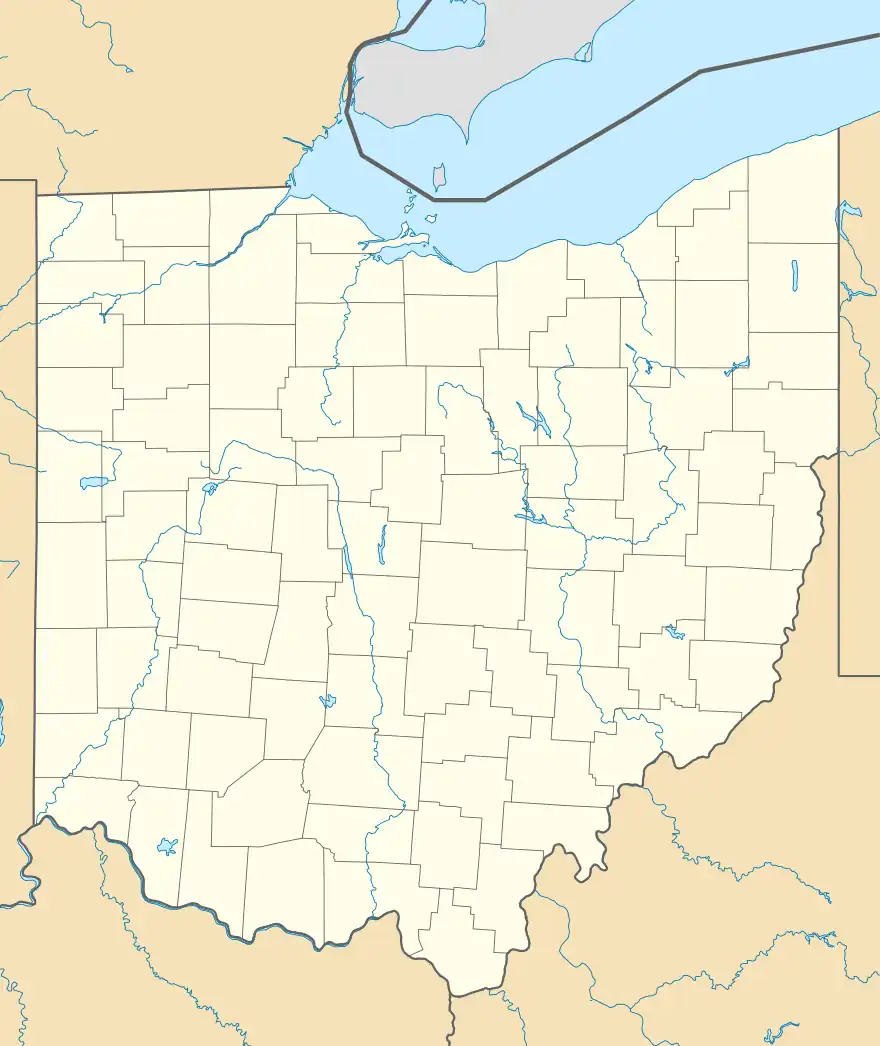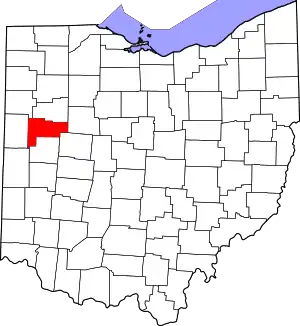H.E. Fledderjohann Property
The H.E. Fledderjohann Property is a complex of five historic buildings in the village of New Knoxville, Ohio, United States. Three of these structures — a house, a doctor's office, and a standalone kitchen building — were owned and used by Fledderjohann, a prominent New Knoxville physician in the late nineteenth and early twentieth centuries.
H.E. Fledderjohann House, Doctor's Office and Summer Kitchen | |
 Front of the house, with the office to the right and the kitchen to the left | |
  | |
| Location | 107 E. German St., New Knoxville, Ohio |
|---|---|
| Coordinates | 40°29′36″N 84°18′56″W |
| Area | 2 acres (0.81 ha) |
| Architectural style | Italianate, Queen Anne |
| NRHP reference No. | 93001388[1] |
| Added to NRHP | December 10, 1993 |
Fledderjohann's life
Dr. Fledderjohann was the son of Herman Fledderjohann, a native of Prussia who immigrated to present-day Auglaize County in 1835. Soon after arriving, the elder Fledderjohann began laboring in the construction of the Miami and Erie Canal, and his diligence quickly led to him becoming a foreman and a leading man in the community. He was twice married and fathered eighteen children; among the sons borne by his second wife were Henry and B.A. Fledderjohann, who served in the Ohio House of Representatives.[2] Henry Fledderjohann graduated from the medical school of the University of Pennsylvania in 1886.[3] Upon entering the medical profession, Fledderjohann was well regarded by other physicians; he was a member of the Northwestern Ohio Medical Association,[4] and in 1906, he was elected to the vice presidency of the Auglaize County Medical Society.[5] For a time, he was also a public official, acting as the health officer for the New Knoxville Board of Health in 1902.[6] Besides serving the community as a family doctor, Fledderjohann was also an inventor; he was granted a patent for a type of steam turbine in 1913.[7]
Buildings
Fledderjohann's house was built in 1879 by Gustave Zuelch, Fledderjohann's predecessor as community doctor; he served the village from 1878 to 1888.[8] Located adjacent to the house is the doctors office.[9] Built in 1890,[10] the office is a one-story brick building with small rounded windows that open into the attic.[11] The kitchen is a one-story frame structure located immediately behind the house.[12] These three buildings were listed together on the National Register of Historic Places in 1993, primarily because of their connection to Fledderjohann.[1] Today, Fledderjohann's property is operated as a museum by the New Knoxville Historical Society, with his residence as a historic house museum. Besides the three landmarked buildings, the museum complex includes a barn, a barber shop and a small log house.[9]
References
- "National Register Information System". National Register of Historic Places. National Park Service. March 13, 2009.
- Williamson, C.W. History of Western Ohio and Auglaize County. Columbus: Linn and Sons, 1905, 688-689. Accessed 2010-06-01.
- McMurray, William J., ed. History of Auglaize County Ohio. Vol. 1. Indianapolis: Historical, 1923, 275.
- Ohio State Medical Society. Transactions of the Fifty-Sixth Annual Meeting Held at Cincinnati, Ohio May 8, 9, 10, 1901. Cleveland: Savage, 1901, 458.
- "Medical News", Cleveland Medical Journal 5 (1906): 160.
- Ohio State Board of Health. Annual Report of the State Board of Health of the State of Ohio, For the Year Ending October 31, 1901. Columbus: State Board of Health, 1902, 209.
- Fledderjohann, Henry E. "Twin Cylinder Reversible Turbine." Patent 1,064,824. 17 June 1913.
- Dwelling Built in 1879, New Knoxville Historical Society, n.d. Accessed 2010-06-01.
- The Heritage Center Complex, New Knoxville Historical Society, n.d. Accessed 2010-06-01.
- National Register Plaque 1994, New Knoxville Historical Society, n.d. Accessed 2010-06-01.
- Dr. Fledderjohann's Office & Brick Project, New Knoxville Historical Society, n.d. Accessed 2010-06-01.
- The Summer Kitchen, New Knoxville Historical Society, n.d. Accessed 2010-06-01.
